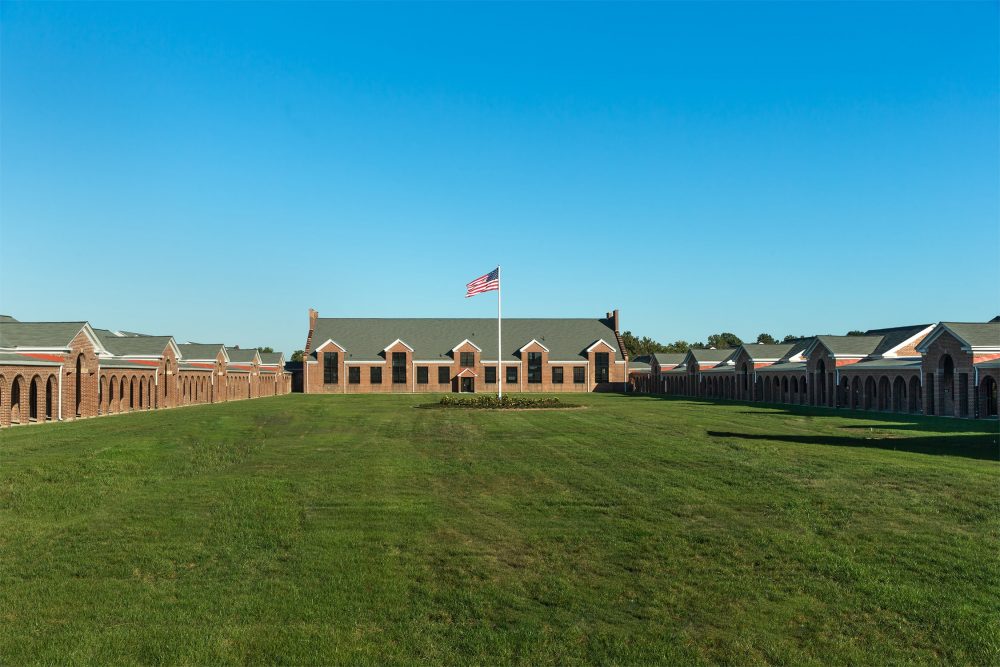Right now, it’s hard to imagine anyone working or shopping, much less living in the former Lorton prison complex.
Visitors to the construction site, which opened for a public tour the morning of Apr. 16, are greeted by an aging, octagonal guard tower with an observation deck bordered by a rusty metal railing.
Piles of brick and cinder blocks litter the dirt paths that link squat, utilitarian buildings that have been worn down by weather, time and disuse and until recently housed asbestos and lead paint. Scraggly patches of grass fill courtyards or seep into cracks in the asphalt surfaces of basketball courts, which feature nets still dangling from the hoops.
Yellow tape suggesting caution and bright red tape warning of danger in all-caps stand out in a landscape otherwise dominated by dull grays and browns.
Though major renovations are needed to transform this site into a habitable space, many of these structures won’t be demolished. Instead, they will be incorporated into Liberty at Laurel Hill, the mixed-use community that Fairfax County plans to establish in the area.
“The idea is to maintain the historic character and features of the space,” Addison Lecy Siewert, who designed the site’s master development plan, said.
Lecy Siewert works for The Alexander Company, a developer based in Madison, Wis., that specializes in historic preservation and urban revitalization.
After taking ownership of the former prison, which closed in 2001, from the D.C. Department of Corrections in 2002, Fairfax County came up with an adaptive reuse plan based on task force recommendations delivered in 2004.
The county Board of Supervisors approved a Laurel Hill Adaptive Reuse Area Master Plan submitted by The Alexander Company in 2010 and officially gave the company control of the project’s design, engineering and zoning in September 2011.
The Alexander Company previously worked in the Washington, D.C., metropolitan area as the master developer for the National Park Seminary site in Silver Springs, Md.
In addition to continuing to work with the county, The Alexander Company has multiple corporate partners on the Laurel Hill project.
The McLean-based real estate development firm Elm Street Development has been charged with overseeing the site work and infrastructure, and Baltimore, Md., contractor Southway Builders serves as the construction manager. Van Metre Homes will build all 24 of the community’s planned single-family houses.
Because the federal government lists the Lorton Reformatory on its National Register of Historic Places, The Alexander Company has to collaborate with the National Park Service and the State Historic Preservation Office when designing and constructing the new mixed-use community.
The company will receive tax credits based on a percentage of the total project development costs if it conforms to the park service’s rehabilitation guidelines, which includes the maintenance of view corridors and the preservation of significant structures and the landscape.
Many facilities will be located in existing structures, and the guard towers that overlook the site will remain standing, though only one will be open to the public. Signs marking old prison dormitories will be left on the buildings, most of which will be converted into apartments.
One building will be transformed into a community pool with the structure’s exterior creating a wall around the open-air facility.
“It’s a constant give-and-take and a big compromise,” Lecy Siewert said in reference to working with the park service. “When you get a lot of stakeholders involved in something of this scale, it takes a long time to develop a plan.”
The first phase of the project, which is currently underway, involves the conversion of prison buildings into 165 loft-style apartments for a complex that will be called Liberty Crest, 83 new townhomes and 24 single-family homes, and the creation of a clubhouse, the swimming pool, and commercial and retail space.
Phase one is scheduled to be completed in April 2017.
The second phase will add 74 additional townhomes, six condominiums constructed out of a guardhouse, and 110,000 square feet of retail and commercial space.
The Alexander Company estimates that the redevelopment of Laurel Hill will cost around $192 million.
Liberty at Laurel Hill will also include 20,000 square feet of green space called Liberty Greens.
More information on the Laurel Hill project can be found on the Fairfax County website and at thelibertylife.com.

